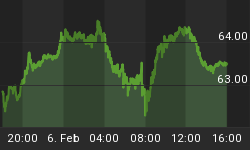
In the next month China and Japan (China's main trading partner) will no longer use the U.S. dollar as the only currency in trade with each other. They will use the Yuan and the Yen directly with each other. This will see the dollar removed from a large chunk of the world's trade -in itself, not a very large percentage, but a significant one. It's the start of a trend that is set to grow. We've no doubt that China is tailoring its trade with all its trading partners to use the dollar only so far as it is required to deal with the U.S. and other dollar-dependent nations. Oil from Russia utilizes the Yuan and Rouble, and Australia has arranged a similar deal.
The purpose of foreign exchange and gold reserves is to provide 'global money' (which includes gold) for potential rainy days. China will therefore build up reserves in all the currencies that it will trade in. All this will take place at the expense of the dollar. Currently the U.S. dollar is used in around 76% of the world's trade. More importantly for the dollar, its use as a reserve currency (it currently comprises 63% of global reserves) will diminish in line with the growth of Yuan/ other currencies.
Currencies in Japanese/Chinese Trade
To explain the process more clearly, when a Chinese company buys goods from Japan, it sells Yuan and buys dollars in its place, for delivery to the Japanese supplier. The Japanese supplier then sells the dollars for Yen. This brings many risks to the transaction because both the Yen and the Yuan are constantly moving against the dollar and the dollar is driven by its own economy and pressures. By going direct, these risks and extra costs are eliminated. Likewise the influence of the U.S. over global trade is diminished, for this trade will no longer require the vast amount of trade to go 'via New York'.
U.S. Power and Influence Changing
Earlier this month, we produced an article that discussed the purchase of Iranian oil in the Yuan and Indian Rupee. U.S. influence and power over world oil supplies has been complete because of the sole use of the U.S. dollar in the oil price. But when Iran dropped the dollar from its oil sales, this power was undermined. The U.S. tried to bring India and China on board in punishing Iran -over its nuclear developments-- but had extremely limited success. The U.S. then used the SWIFT system of banking alongside its own banking system to block Iranian oil sales and their payments. China and India used their own currencies and clearing systems to bypass these blockades. As we pointed out in the earlier article, this was not simply a financial development but a shift in power to the East. The Iran story highlights the importance of the development of the Yuan's growing use.
China's viewpoint is not to challenge or attack the U.S. but to develop systems that will be in its own interests and independent of outside political or financial influences. Unhappily for the U.S. this is leading to the decline in U.S. power, both politically and financially. With China and the emerging world accounting for over half of the world's population, the potential growth here will mean an eventual huge curtailment in U.S. power and influence. The agreement with Japan marks a major step forward in this process.
Fragmentation of the Present Monetary System
Since the Second World War and through the Bretton Woods system to today's monetary system, the dollar and the U.S., with its power and wealth, has ensured its continued success, sometimes against basic fundamental reasoning -such as the ability of the U.S. to just print dollar to cover its Trade Deficits on an ongoing basis, a sort of Tax on the rest of the world. Indeed, the dollar, with its link to oil, is the tree-trunk of world money with all other currencies acting almost as branches growing out of that tree. The steps being taken by China now is another tree (currently a sapling) growing alongside it and eventually no longer dependent on it. The worry is that this new tree is sapping the old tree of its strength. We are certain that China will do all in its power to ensure it minimizes the influence the U.S. has over its financial system.
The dangerous period for the two trees is when the new sapling is not strong enough to stand alone and the old tree is ailing. This is the time when support is needed for both. That support has to be independent of both for it to give effective support. That support must convince all in the monetary world that it will give enough inherent strength to shore up the weaknesses of both. But at the same time this support must be a common denominator throughout the financial world.
If the transition of power and through changes is smooth, then a new shape to the world's money will be easily accepted. But in all of man's history, such transitions have been far from smooth or peaceful; they've been marred by confrontation and breakdown and usually both. We see this future for the monetary world in the face of these developments.
With the debt debacles on both sides of the Atlantic, the developed world's monetary system is vulnerable to such pressures as never before. The monetary system now faces structural pressures that are bound to lead to turmoil and deeper crises, not simply inside nations, but ones that will shake up global foreign exchanges and breed more and more uncertainty. The last few years of financial crises in the developed world will seem tame by comparison. The separate interests of the developed world and the emerging world will emphasize the uncertainty and lack of confidence that will hang like a cloud over the world's changing money systems.
Member's only:
Gold Affected
Get the rest of the article. Subscribe @
www.GoldForecaster.com / www.SilverForecaster.com















